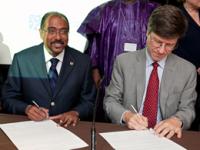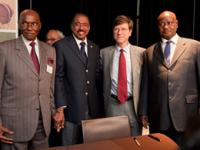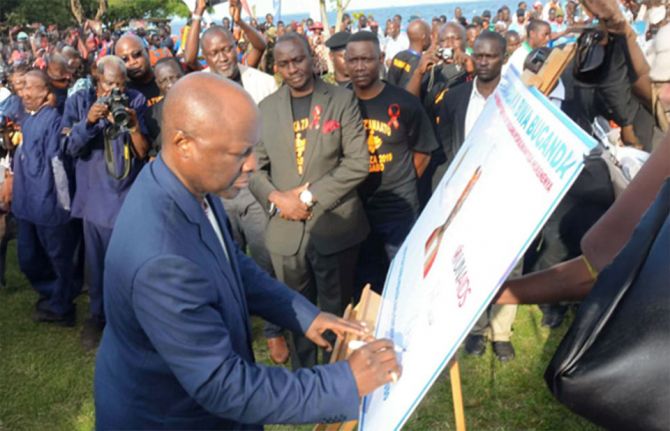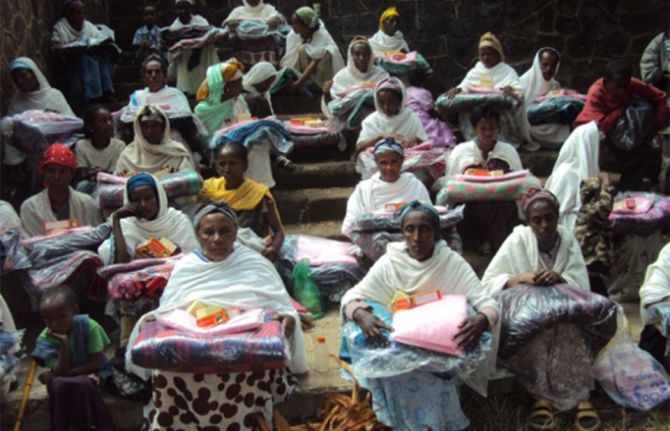
Feature Story
UNAIDS, Millennium Villages join forces to keep children free from HIV in Africa
21 September 2009
21 September 2009 21 September 2009
UNAIDS Executive Director Michel Sidibé and Prof. Jeffrey Sachs, Director of the Earth Institute, signing the agreement. 21st September, New York.
Credit: UNAIDS/B.Hamilton
UNAIDS and the Millennium Villages Project signed an agreement in New York to strengthen efforts to eliminate mother-to-child transmission of HIV in Africa. The aim of the partnership is to help local governments create “Mother to child transmission-free zones” in 14 ‘Millennium Villages’ across ten African countries.
The Millennium Villages Project, a partnership between The Earth Institute at Columbia University, Millennium Promise, and UNDP, seeks to end poverty by working in rural areas throughout Africa. The new initiative will use the existing infrastructure, human capacity and technical resources in the villages, to help rapidly expand family- and community-centered heath services with focus on stopping new HIV infections among children.
UNAIDS Executive Director Michel Sidibé and Prof. Jeffrey Sachs, Director of the Earth Institute, signed the agreement in the presence of business and African leaders. The ceremony was held under the auspices of President Yoweri Museveni of Uganda and President Abdoulaye Wade of Senegal.
“I salute this partnership to help protect mothers and their children from HIV. This initiative will mobilize resources and generate political will to save young lives, leading to a generation of African children born free of HIV,” said President Wade.

(L to R): President Abdoulaye Wade of Senegal, UNAIDS Executive Director Michel Sidibé, Prof. Jeffrey Sachs, Director of the Earth Institute and President Yoweri Museveni of Uganda.
Credit: UNAIDS/B.Hamilton
Also speaking at the ceremony were Dr Lydia Mungherera, a Ugandan HIV prevention activist representing the organizations HIV+ and TASO. The Executive Director of UNICEF, Ms Ann M. Veneman, the Minister of State of Mali, Mr. Abou Sow; the South African Minister of Health Dr. Aaron Motsoaledi; and Ambassador Eric Goosby, MD, the United States Global AIDS Coordinator participated in a panel discussion at the event.
Each day 1,200 children under the age of 15 are infected with HIV; 90% of these infections occur in sub-Saharan Africa. According to Mr. Sidibe, “In all of Western Europe there were fewer than 100 mother-to-child transmissions (MTCT) in 2007, whereas in sub-Saharan Africa, there were more than 370,000.”
The top priorities outlined in the memorandum include measures to ensure that women of child bearing age avoid getting infected, those that are infected avoid unwanted pregnancy; increase access to antenatal care services; HIV testing and counselling to expectant mothers; and expanded access to HIV prevention and treatment services for children.
The agreement will bring together the Millennium Village Project’s multi-sectoral and science-based development and primary healthcare strategy with UNAIDS’ expertise in community and family-centred prevention strategies in order to create ‘MTCT-free zones’, whose progress will be monitored by both entities.

Executive Director of UNICEF, Ms Ann M. Veneman, South African Minister of Health, Dr. Aaron Motsoaledi, and UNAIDS Executive Director Michel Sidibé.
Credit: UNAIDS/B.Hamilton
“We hope that the creation of ‘MTCT-free zones’ in the Millennium Villages will serve as a model that can be used throughout Africa whereby communities are engaged, men and young people are active partners, and children are born free from HIV,” Mr Sidibé said.
In 2007, there were 2 million children under 15 years living with HIV, up from 1.6 million in 2001 and less than 15% in need of treatment were getting it. In sub-Saharan Africa, only a third of pregnant HIV-positive women received the antiretroviral treatment (ART) to prevent transmitting the infection to their infants, compared with nearly 100% in Western Europe.
Operating in 14 sites in 10 sub-Saharan African countries, the Millennium Villages project has been working with local governments to introduce a model primary health system which will cover approximately 500,000 people.
The Villages work on a model primary health system and include education, nutrition and economic development. The primary health systems include; free services at the point of care; trained professional community health workers; a network of adequately staffed primary clinics; access to a mobile communication network and emergency transport services to facilitate referrals; and a local referral hospital to support second-tier care. The system houses a monitoring and evaluation platform that can readily assess the adequacy, uptake and impact of HIV testing and counselling and family centered HIV prevention services.
UNAIDS, Millennium Villages join forces to keep c
Cosponsors:
Partners:
Feature stories:
Deputy President of South Africa echoes UNAIDS priorities at international AIDS conference (20 july 2009)
Lesotho: HIV free babies bring hope (16 July 2009)
Press centre:
UNAIDS calls for a virtual elimination of mother to child transmission of HIV by 2015 (21 May 2009)
Development leaders point to significant progress in mother and child health and reduction of malaria and AIDS deaths in poorest nations (23 September 2008)
Publications:
Prevention of HIV Transmission from Mother to Child (pdf, 222 Kb.)



